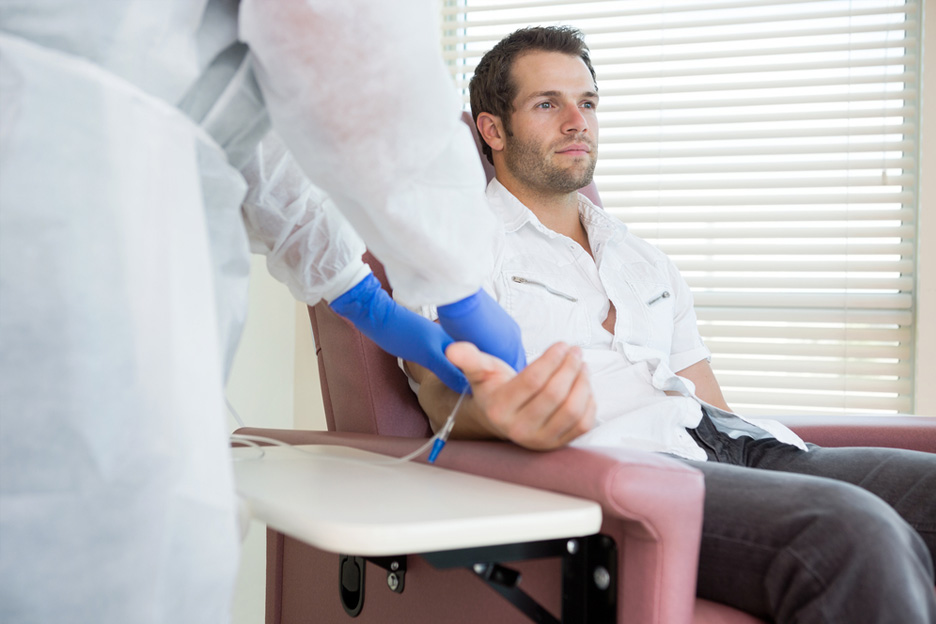Learning that you have cancer is undoubtedly shocking; faced with the unknown, it is normal to feel helpless. Because this diagnosis usually involves chemotherapy and radiation therapy, here is some information about these types of treatments.

Fighting cancer
These days, fortunately, there are many ways to treat cancer. After receiving your diagnosis, you and your doctor will most likely want to discuss the options that are available to you. Among them are chemotherapy and radiation therapy. The choice of treatment will depend on several factors, such as the type and stage of the cancer, your health condition and your preferences. The words “chemotherapy” and “radiation therapy” may sound scary to you, but being well informed about these types of treatments will allow you to demystify them and to make the right choices for your health. Your doctor and other health professionals around you will be able to answer your questions, but here is a bit of information that, we hope, will be useful to you.
What is chemotherapy?
The cells in your body follow a cycle during which they are divided and, consequently, multiply. This usually occurs at a steady, well-balanced pace. Cancer cells, for their part, have a faster, more random cycle than normal cells. Chemotherapy medication interrupts the cells’ cycle and slows down, or stops, the reproduction of cells. It acts on cancer cells, but also on healthy cells, which leads to side effects. Chemotherapy can either be curative, i.e. aiming at curing the disease, or palliative, i.e. aiming at slowing down the disease’s progression and alleviating the symptoms of cancer.
There are several ways to administer chemotherapy medication. Most of the time, it is injected intravenously at the hospital. Others can be taken orally, for example. Your chemotherapy treatment might take place every day over a certain period of time, or according to a pre-set schedule determined by your medical team. But rest assured; you will be surrounded by several health professionals who will guide you through each step of the process.
Side effects of chemotherapy
Chemotherapy often causes side effects, some of which can be quite bothersome. They vary from one medication to another and each person is affected differently. Some of the most commonly reported side effects of chemotherapy are:
- hair loss;
- nausea and vomiting;
- fatigue;
- weight loss;
- diarrhea or the opposite, constipation;
- pain and redness in the mouth (stomatitis);
- weakened immune system;
- etc.
There are several ways to alleviate the unpleasant side effects you may experience. Your pharmacist and your doctor will be able to help you with this issue.
What is radiation therapy?
Radiation therapy is often one of the available treatments for cancer. This method uses radiation to eradicate cancer cells. Between radiation-therapy sessions, the damaged cancer cells don’t have enough time to regenerate and eventually die. Just like chemotherapy, radiation therapy affects not only cancer cells, but also healthy cells. However, contrary to cancer cells, healthy cells can repair themselves and regenerate between radiation-therapy sessions. The goal is to find the right balance between the amount of radiation to administer that will destroy cancer cells and the one that will have the least effect on normal cells. There are several kinds of radiation therapy, depending on the type of cancer you have. The most common is external beam irradiation, which consists of directing a radiation beam through the skin to reach the tumour.
In general, radiation therapy requires several sessions over a few weeks, and takes place at the hospital. Your medical team will guide you through the preparation steps for radiation therapy. During the treatment, X-rays will be directed towards the area to treat and you will need to stay still throughout. You should not feel any specific sensations during the procedure, which lasts about 15 minutes.
Side effects of radiation therapy
Radiation therapy also has its fair share of side effects. They vary from one type of treatment to another, depending on the area of the body that requires treatment, as well as the health condition of the patient. Here are a few examples of side effects associated with radiation therapy:
- fatigue;
- nausea and vomiting;
- skin reaction on the treated area;
- weakened immune system;
- anxiety;
- sleep disorders;
- etc.
Some of radiation therapy’s side effects are quite similar to those of chemotherapy. In both cases, there are ways that your pharmacist and doctor can recommend to alleviate them.
A few tips
If you have to undergo chemotherapy or radiation therapy during your cancer treatment, here are a few tips:
- Rest as much as possible between treatment sessions. Chemotherapy and radiation therapy can make you very tired. Now more than ever, you need to take care of yourself, so get some sleep and take the necessary steps to relax: massage therapy, meditation, music therapy, etc.
- Ask a lot of questions to your medical team before, during and after treatment sessions.
- Ask people that you trust to accompany you. Not only can it be difficult to drive after treatment sessions, but being with someone will also make them more pleasant.
- Involve your loved ones in your treatment. Explain how it works, as well as its advantages and disadvantages.
- If you are finding it difficult to fight cancer and cope with treatment, consider seeing a psychologist. Your medical team can provide you with information on the many resources that are offered to you to reduce the impact of cancer on your life.
It is true that the path to recovery from cancer can sometimes be filled with difficult steps. Embracing a positive, confident attitude will help you deal with this experience. Don’t forget that in union there is strength, so surround yourself with people and professionals on whom you can count to help you find the means to return to health. Teamwork is the key to a future celebration of your victory over cancer!
